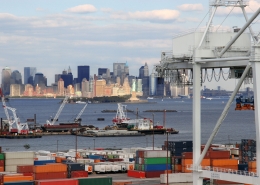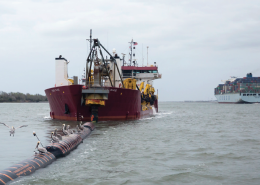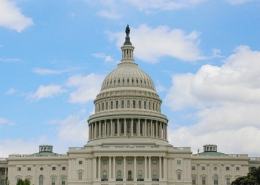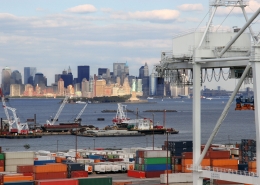Mort Downey, a towering figure in national and local transportation policy for the last half-century who served as Deputy Secretary of Transportation for all eight years of the Clinton Administration, died yesterday at age 87 after a long respiratory illness.
Downey was a longtime member of the Eno Center’s Board of Directors from 2002-2014. Former U.S. Transportation Secretary Jim Burnley, who had also preceded Downey as Deputy Secretary, said “Mort was a great role model for us all, as well as a stalwart friend of Eno.”
Mortimer L. Downey III was born August 9, 1936 in Springfield, Massachusetts. A scholarship student to Phillips Andover Academy, he graduated from Yale University in 1958 and, to hear him tell the story, interviewed with every bank and financial institution that was recruiting at Yale that summer, to no avail. Forced into public service, he took a management trainee job at the Port Authority of New York and New Jersey, where he would spend the next 17 years (mixed in with a career as a Coast Guard Reserve officer and four years of night school at NYU to get a masters degree in public administration in 1966).
After several years working in the planning department on NYC-area transportation forecasts and urging the Port Authority to become more involved in mass transit, Downey became part of the team that took over the bankrupt Hudson and Manhattan Railroad and its tunnels under the Hudson River to become what is now the PATH system.
In 1975, Downey accepted an invitation to relocate to Washington DC and become the first-ever transportation analyst for the new House Budget Committee. At the time, Budget was not sure if they needed just one person to look at all aspects of transportation, but with the Port Authority covering transit and aviation and highways and harbors, and with Downey being a “Coastie,” he was ideal for the role. He later said that he had to have a personal interview with House Majority Leader Jim Wright (D-TX), who had just given up the potential chairmanship of the Public Works and Transportation Committee to become Leader, and Wright made him promise not to try to abolish the Highway Trust Fund as a condition of employment.
While at HBC, Downey played a role in the establishment of the first obligation limitation on the federal-aid highways program (made necessary because the just-enacted Impoundment Control Act released so much backlogged funding into the system that it was causing inflation).
The chairman of Budget during that time was Rep. Brock Adams (D-WA), who late in 1976 was named Secretary of Transportation by incoming President Jimmy Carter. Adams took Downey with him to USDOT, briefly as Deputy Under Secretary and then, in a mid-1977 reorganization, creating the new role of Assistant Secretary for Budget and Programs for him.
There, Downey played key roles in negotiating the 1978 surface transportation bill (including trying to convince Carter to sign it after a last-minute fight with OMB as to how much money the bill actually provided – see here for details) and in creating the Inland Waterways Trust Fund also in 1978. Downey did enough of a good job that, when Carter fired Adams (who had refused Carter’s orders to fire his Deputy Secretary and General Counsel [another aide], who were also brought to DOT from HBC by Adams) in the Great Purge of 1979, Downey stayed on in the same role under the new Secretary until the end of the Carter Administration.
(He also gave an interesting presentation on inflation’s effects on transportation costs to the Eno Center’s October 1979 policy conference.)
At that point, Downey went back to New York, but this time to work at the Metropolitan Transportation Authority (MTA), North America’s largest mass transit system, as Deputy Executive Director in charge of financial management and budget, where he helped the MTA dig out of the deep hole in which the agency had found itself in the 1970s. (For budget nerds: Downey’s testimony before House Public Works and Transportation in June 1983 is really interesting to this day.)
By 1986, Downey had been promoted to Executive Director of the MTA, running day-to-day operations under chairmen Bob Kiley and Peter Stangl. This, with the rest of his background, qualified him to become President Clinton’s nominee for Deputy Secretary of Transportation, the “COO” role of that Department. At his May 1993 Senate confirmation hearing, Senator Pat Moynihan (D-NY) gave him a glowing recommendation, and he was confirmed unanimously by the Senate less than two weeks later.
As the “S-2,” Downey had a hand in every single important transportation initiative or response made by USDOT for those eight years, including the landmark 1998 TEA21 surface transportation bill, the creation of the Air Traffic Organization within the FAA, and the Amtrak reform act. He acted as the chief operating officer of the Department, making sure the modes were responsive to orders from upstairs, but he also represented the Department to the White House, OMB, and the rest of the Clinton Administration in behind-the-scenes policy discussions. (The Department, at this time and through most of its history, followed the “outside/inside” model for the Secretary and Deputy Secretary, with the Secretary responsible for public announcements and dealings with elected officials, and the Deputy Secretary taking a much less public but vital role.)
In recognition of the unique role of the Deputy Secretary, the Eno Center, in cooperation with Mort Downey, last month established the Mortimer L. Downey Fellowship, to collect best practices and insights into this position from prior occupants and working to help new nominees.
Downey served as Deputy to both Secretaries Federico Pena and Rodney Slater, and stayed on as Acting Secretary for the first five days of the George W. Bush Administration until Norman Mineta was sworn in as Secretary on January 25, 2001. After that, he stayed in the D.C. area and took up consulting work with Parsons Brinkerhoff.
He chaired the transportation transition team for the incoming Obama Administration in 2008-2009 and was responsible for Team Obama allowing George W. Bush’s Deputy Secretary of Transportation, Thomas Barrett, to stay on until May 1, 2009, when the Administration was more fully staffed up, in case of an emergency when an experienced hand was needed.
Downey was named to the Washington Metropolitan Area Transportation Authority’s Board of Directors in 2010, and eventually chaired the Board before leaving in 2016.
He was predeceased by his wife Joyce and is survived by two sons and seven grandchildren.
Addendum November 9: Something I forgot when I wrote this three days ago – Mort Downey was very proud of his eight years of service as “S-2,” to the point that he always wanted to get a personalized license plate mentioning it, but his wife would never let him do it. After her passing, he did it. Here is the photo I took when I parked next to his car on my way to see him seven weeks ago:















